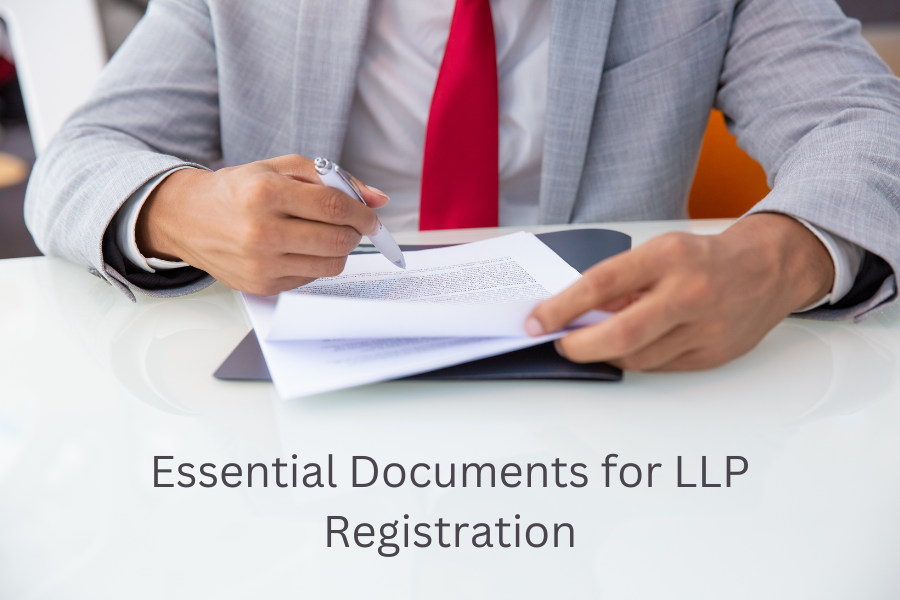Limited Liability Partnerships (LLPs) offer a blend of partnership flexibility as well as corporate protection, making them a popular choice for small and also medium-sized businesses. Understanding the necessary documents for LLP formation is crucial for a smooth registration process. Here’s a detailed look at the essential documents required for LLP registration in India.
1. PAN Card
Firstly, each partner must provide their Permanent Account Number (PAN) card, which serves as a unique identification number issued by the Income Tax Department.
Address Proof: Partners need to submit valid address proof, such as:
- Passport
- Voter ID
- Aadhaar card
- Utility bills (not older than two months).
2. Documents for Foreign Nationals
Additionally, foreign partners must provide additional documentation:
- Notarized Passport: A notarized copy of the passport is mandatory, along with an additional document indicating the date of birth if not included in the passport.
- Residential Proof: This can be a bank statement or utility bill, also notarized if in a foreign language.
3. Registered Office Proof
To establish a registered office in India, the following documents are required:
- Utility Bill: A recent utility bill (electricity, water, etc.) showing the address of the registered office.
- No Objection Certificate (NOC): A NOC from the landlord permitting the use of the premises as the registered office.
- Rental Agreement: A copy of the rental agreement between the LLP as well as the landlord.
4. Digital Signature Certificate (DSC)
A Digital Signature Certificate is essential for electronic filing of documents. All designated partners must obtain a DSC from authorized certifying agencies. This certificate typically has a validity of one to two years.
5. Designated Partner Identification Number (DPIN)
Every designated partner must obtain a DPIN, which is necessary for filing incorporation documents. You can further apply for this online through the Ministry of Corporate Affairs portal.
6. LLP Agreement
The LLP agreement outlines the rights and responsibilities of partners and also you must file it within 60 days of incorporation. You must sign it on stamp paper, with stamp duty varying by state.
7. Subscriber Sheet
This document lists all partners and also must be witnessed by a professional such as a lawyer or chartered accountant. It is submitted alongside other incorporation documents.
8. Recent Passport-Sized Photographs
All partners must submit recent passport-sized photographs as part of the registration process. You typically need these photographs for various forms and documents, ensuring that the identity of each partner is clear and also verifiable.
9. Signature Verification
Also, each partner must provide a sample signature on official documents. You use this signature for identification purposes in all legal agreements as well as filings related to the LLP. Ensuring that the signatures are consistent across documents is crucial for maintaining legal integrity.
10. Proof of Ownership or Lease Agreement
In cases where the registered office is owned by one of the partners, you must submit proof of ownership. This can include title deeds or property tax receipts. If the office is rented, then a lease agreement detailing the terms of occupancy must be provided alongside the No Objection Certificate (NOC) from the landlord.
11. Compliance with Local Regulations
Also, depending on the state in which the LLP is being registered, additional local regulations may apply. For instance, some states may require specific forms or additional documentation to comply with local business laws. It’s advisable to consult local authorities or legal experts to ensure you meet all regional requirements.
12. Additional Documentation for Specific Business Types
Finally, certain industries may require specialized documentation based on regulatory requirements. For example, businesses in finance or healthcare might need licenses or approvals from relevant regulatory bodies before proceeding with LLP registration. Ensuring compliance with industry-specific regulations can prevent delays in the registration process.
Conclusion
Hence, registering an LLP involves meticulous preparation of various documents to ensure compliance with legal requirements. By gathering these essential documents—identity proofs, registered office details, digital signatures, as well as agreements—business owners can facilitate a smoother registration process and also set their LLP up for success.




